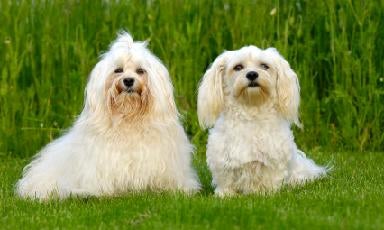Havanese Dog Training & Havanese Breed Information
The Havanese is an excellent companion breed for families or apartment dwellers - for anybody who loves a cheeky little companion dog really.
The Havanese are a good breed for people who have children or other animals, since they are both sturdy and good-tempered. Their enthusiastic and lively personalities are larger than their tiny size would indicate. They are small enough and have the right temperament to live in a city apartment.
Very happy and friendly dogs, Havanese have excellent attitudes. They are extremely intelligent and playful. They are curious, lively little animals, always willing to join in when there is any fun going on. They are happy-go-lucky dogs that are always a delight to have around.
This breed is a close relative to the Bichon Frise, and they display many of the same clownish antics. With proper training, Havanese frequently are some of the most delightful dogs that you will ever encounter. A relatively rare breed, Havanese only belong to those who are willing to be patient enough to wait for a puppy. Havanese owners know that they are more than worth the wait. This joyful animal is easy to train, energetic, smart, and generally a delight to have around.

History of the Havanese Dog Breed
The Havanese, as its name indicates, was developed in Cuba (its name derives from the city of Havana). It is a breed of the type known as "Bichon", which are essentially small fluffy lap dogs once owned by European aristocracy. The Havanese is a descendant of the now-extinct Bichon Tenerife, a breed brought to the Canary Islands by Spanish traders.The Havanese breed became extremely popular in Cuban aristocratic circles, and the breed enjoyed great favor during the early days of economic growth in the Mediterranean and the Caribbean. Their popularity spread to Europe, and the little Havanese was a common sight throughout the 1700s.
The Cuban revolution almost ended the existence of the breed, particularly in the Western Hemisphere. This breed was a casualty of the cultural change of the times, which, during and after the revolution, regarded anything associated with the upper class to be repugnant. Many of the dogs were taken from Cuba along with their fleeing owners, and the dogs became scattered, eventually almost destroying the breed.
A few US breeders are responsible for reviving interest in the little Havanese. When the breeding program began in the early 1970s, it is said that only 11 animals remained in the nation. Eventually, however, enthusiasts successfully re-established the breed, which is enjoying a renaissance. Its popularity is once again growing by leaps and bounds and it's little wonder why ;)
Havanese Appearance
Havanese dogs are quite distinctive, having some characteristics that they do not share with any other breed. Havanese are toy dogs, standing between 8.5 and 11.5 inches at the withers (the top point of the shoulder). They usually weigh between 7 and 13 pounds.Despite their small size, they are sturdy dogs, and this should be evident in the appearance. They have a strong, rectangular body, with a back that is higher at the rear than at the shoulders. They have an energetic and springy walk.
The Havanese coat is distinctive to the breed. They are covered with a soft, light, silky double coat that originally protected them from the hot tropical sun. They can come in almost any color or combination of colors, including white, brown, black, silver, blue, cream, and buff.

The Havanese Temperament
A delightful dog in so many ways, one of the most outstanding traits of the typical Havanese is their extraordinarily appealing temperament.Of course, each puppy or dog is an individual, and will have its own personality. However, many characteristics are typical of the breed. It is essential that only reputable breeders be used by anyone who wishes to acquire a purebred puppy. This is particularly important in the case of the more rare breeds such as the Havanese, because the health and temper of the breed depends on the conscientiousness of the breeder.
The Havanese is a lively, energetic, little show-off of a dog. Many Bichon types were used as circus performers, and the Havanese would fit right in, since they love to do tricks in order to get your attention. They have very engaging personalities.
- Havanese, unlike most toy breeds, make good pets for families with children. Most small breeds are too nervous and delicate to make good family dogs, but Havanese are hardy enough to be around children, as long as reasonable supervision and behavior from all concerned is enforced.
- The Havanese is a very social dog, becoming extremely attached to its family. It wants to be in on the action at all times. This is NOT a good pet to choose if your dog is expected to spend a lot of time alone in the back yard. The Havanese is a pet that should be around its people as much as possible.
- As energetic as they are, Havanese, because of their small size, only require moderate exercise. They are therefore good dogs for apartment dwellers. While they can keep up with anyone who stays active, they are also calm enough to remain indoors much of the time.
- Despite their lively and energetic traits, Havanese do not tend to be anxious, neurotic, or aggressive in any way. They like to perch on a relatively high place, such as the back of a sofa, and observe everything. They tend to get along well with adults, children, and most other animals.
- Havanese dogs are extremely intelligent. Their alertness and clever antics, given reasonable training, are a continual source of delight and entertainment to Havanese owners - they are a joy to be around.
Havanese Health Information
On the whole, the Havanese is generally a very healthy breed. This is unusual for many purebreds, especially the small dogs whose popularity is soaring like the Havanese. It is especially surprising considering the extremely small gene pool that early fanciers had to start with - just 11 dogs.The fact that the Havanese is so healthy is due to the diligence and care of dedicated and reputable breeders, who guard the health and genetic bloodlines of their animals with ceaseless vigilance. Only reputable breeders should be considered when looking for a Havanese puppy. A breed that is both rare and popular, such as the Havanese, is often exploited by puppy mills, but, these places breed dogs in terrible conditions, and the litters usually end up with grave health and temperament problems due to the unscrupulous breeding practices.
A well-bred puppy can be expected to live between 14 and 17 years. Among the occasional health issues affecting the Havanese are: eye problems, such as cataracts and retinal diseases, hip dysplasia, luxating patellas, dry skin, and "tear" staining on the face. Consult a veterinarian and a good breeder for further information.
One note to keep a Havanese dog in good condition, its coat requires a lot of grooming. Although they are not shedding dogs, the fluffy, full coat is high-maintenance. Regular clipping will keep the coat in good condition. It is customary in show dogs to let the coat grow long, but this requires a lot of maintenance, including frequent brushing and conditioning.
Havanese Dog Training
All dogs require obedience training. Havanese are no exception, and training your dog is the best way to bond with and socialize your pet. Since Havanese are both intelligent and highly motivated to interact with owners, they are really quite easy to train, and very willing to do whatever is asked of them.Havanese are extremely ill-suited to harsh training methods. They are more than willing to learn, so positive, rewards-based training methods will match your Havanese's temperament perfectly. The clownish side of the Havanese loves to learn and perform tricks. I prefer to utilize clicker training techniques when training my Havanese puppies.
The basic commands, such as sit, down, come (recall), will be easy to teach and will provide your Havanese with a good foundation to become the excellent companion that it can be. It is also imperative to teach your Havanese to walk nicely on a loose leash. This is more pleasant for the owner, but is also good for the dog, preventing straining on the collar which can hurt your dog's neck and throat. Small dogs like the Havanese are especially prone to what is sometimes called "reverse sneezing", a raspy, coughing sound that sometimes affects dogs.
Housebreaking is sometimes more difficult, especially with the toy breeds. It's quite simply due to the fact that small dogs have small bladders. However, Havanese are usually simple to housebreak given a consistent and regular supervised schedule - such as this one.
If you plan to train your Havanese at home I highly recommend you follow this great clicker training guide - The 4 Secrets of Becoming a Super Trainer.
Overall you'd have to say that the Havanese is a beautiful little dog breed. As long as you source your puppy from a reputable breeder and provide adequate socialization and training, your Havanese will be a wonderful addition to your family.
Please consult the services of a Professional Dog Trainer, Behaviorist or Veterinarian before implementing any of the advice contained on this site.










